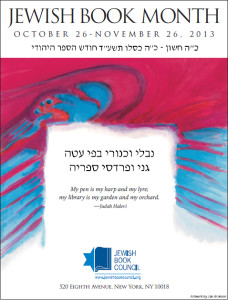My Year In Jewish Books
 For the past two years, I’ve found it useful (and kind of fun) to look back on “my year in Jewish books.” So, borrowing some of the same introductory wording, I’m going to attempt to do something similar for 2013, even if Hanukkah came so early this year that this 2013 iteration lacks the same usefulness a gift-inspiration guide.
For the past two years, I’ve found it useful (and kind of fun) to look back on “my year in Jewish books.” So, borrowing some of the same introductory wording, I’m going to attempt to do something similar for 2013, even if Hanukkah came so early this year that this 2013 iteration lacks the same usefulness a gift-inspiration guide.
Reviewing my reading for 2013 (thank you, Goodreads!), I can see that I do not and would not ever limit my reading to “Jewish books” exclusively. (By the way, in case you haven’t heard me say this before, I define “Jewish books” as books with substantive Jewish content. In my view, non-Jewish authors can write “Jewish books.” And Jewish authors can write books that don’t strike me as particularly Jewish.)
But this year, as usual, I did read quite a few books that fall within the “Jewish book” category. And, as an advocate for Jewish literature, I’m proud of that.
Below, you will find these books presented in the order in which I read them. Please note that, where appropriate, I have included links to reviews, essays, and newsy items I have written; interviews I have conducted; and the odd blog post. I have also disclosed how I obtained each book: P (purchase), R (complimentary review copy/complimentary seminar copy), L (library). (more…)

